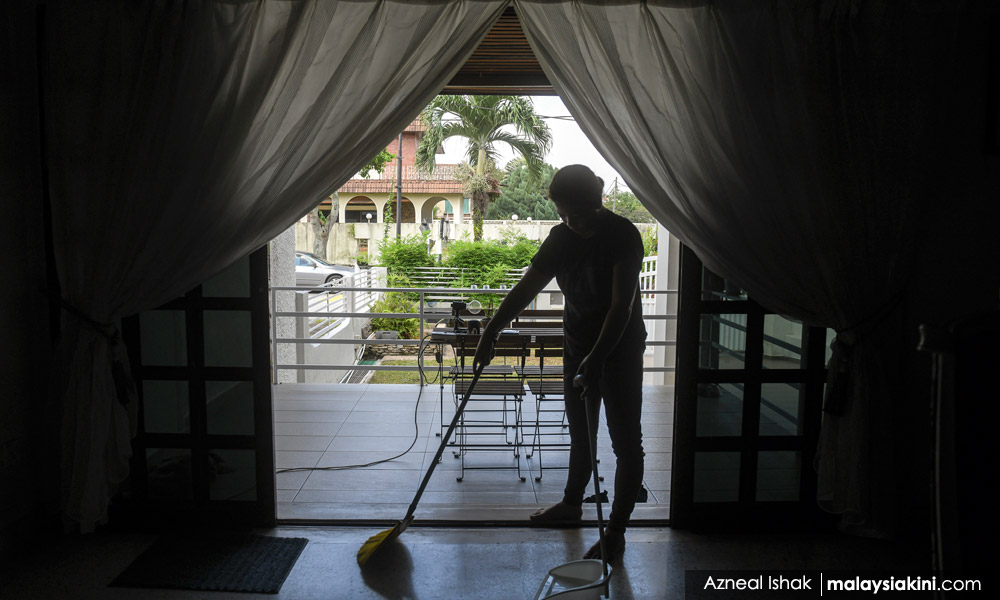More Malaysian households looking to hire Indonesian domestic workers may be forced to explore alternative sources following the new RM1,500 minimum wage agreed by the governments of both countries.
Malaysian Maid Employers Association (Mama) president Engku Ahmad Fauzi Engku Muhsein lamented that many families would not be able to afford the new salary for an Indonesian domestic worker, on top of initial recruitment costs capped at RM15,000.
"There is the possibility that employers will be looking for other cheaper alternatives.
He expressed fears that employers may be forced to take “shortcuts” by hiring domestic workers through irregular channels.

Under the new bilateral terms signed on April 1, Malaysia and Indonesia had agreed that all new recruitments must be carried out through the One Channel System and with improved social protection mechanisms in both countries.
Prior to the deal, Malaysia had allowed the hiring of Indonesian domestic workers who were brought in through the abuse of the MyTravelPass, as well as the Immigration Department's Maid Online System.
Apart from the higher wage, Engku Ahmad pointed out that there are no guarantees for employers on the standard of their hires.
Additionally, new domestic workers now have a narrower job scope - housekeeper and family cook, child caregiver, or elderly person caregiver - and one person cannot be expected to cover all three categories.
"It (the agreement) is a letdown. It is not in the interest of the rakyat," said Engku Ahmad, adding that the government should look into offering more incentives to Malaysians willing to work as domestic workers.
Maids from India, Sri Lanka, Cambodia
National Association of Malaysian Employment Agencies (Papsma) secretary-general Sukumaran Nair said with the new minimum wage and other agreed terms, an employer could expect to pay up to RM1,800 a month, including for work on rest days.
"Indonesian workers are already earning close to RM1,400 per month in Jakarta. So if it (the salary) is not competitive, they will not come over to Malaysia," Sukumaran told Malaysiakini.
The Malaysian government currently allows the recruitment of domestic workers from nine source countries, with a majority of arrivals coming from Indonesia and the Philippines - the former mostly due to cultural and religious similarities.
Aside from the Philippines and Indonesia, Sukumaran said alternative options for domestic workers with an average salary of less than RM1,200 - the old minimum wage - include India, Sri Lanka and Cambodia.
"India is RM1,000, Sri Lanka RM1,000, Cambodia was RM1,100. Most of them took RM800 to RM 1,000 before the pandemic. But now it's different," he said.

Sukumaran, alongside other labour associations, had previously urged the government to also consider opening up the domestic sector for workers from Bangladesh.
Overtime payment
Under the Employment Act 1955, non-recognition of domestic work as formal work has seen those employed in a household often being paid lower than the minimum wage.
The exemptions are listed under Subsection 2(1)(5) of the act's First Schedule, which migrant rights activists in Malaysia have repeatedly called to be removed beyond proposed changes in the main body.
In welcoming the new agreement, Indonesian Migrant Domestic Workers Association (Pertimig) representative Binti Rosidah said the question remains over its enforcement, including on the issue of overtime payment.
"For instance, in cases where a domestic worker is not paid her wages, the MOU (memorandum of understanding between Malaysia and Indonesia) does not specify any punishment.
"And if these cases are taken to court, it is almost guaranteed that a domestic worker will be placed at a disadvantage because of the minimum wage exemption under Malaysia's Employment Act," Rosidah told Malaysiakini.
Malaysiakini had previously reported on cases handled by the Indonesian Embassy in Kuala Lumpur, including successful mediation for payment of more than RM100,000 to a domestic worker owed 12 years of unpaid wages.
Pertimig had in January rallied its members and supporters to pressure the Indonesian government to table a draft Domestic Worker Protection Bill intended as a basic guide for bilateral negotiations. It has been left pending in Indonesia's Lower House for 18 years due to opposition from lawmakers.
Their demands included the recognition of domestic work as formal work, the introduction of social protection and a living wage for the workers, some elements of which were addressed under the new agreement with Malaysia.- Mkini




No comments:
Post a Comment
Note: Only a member of this blog may post a comment.